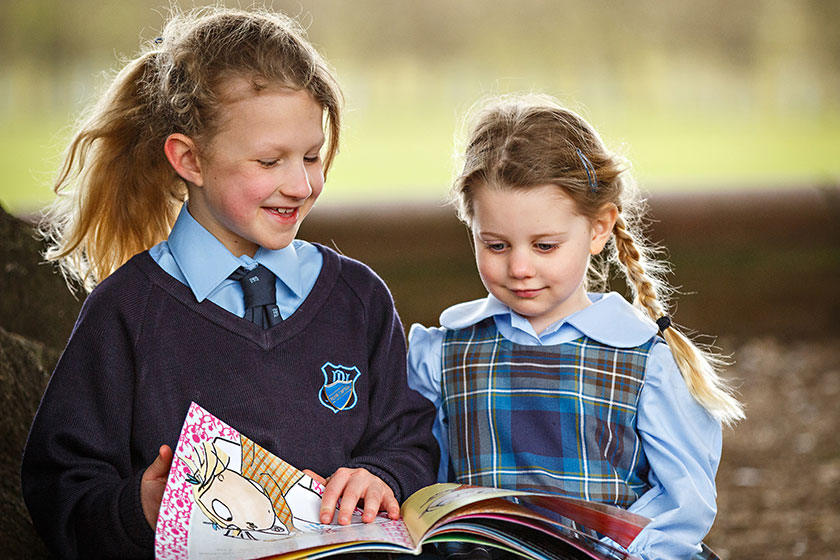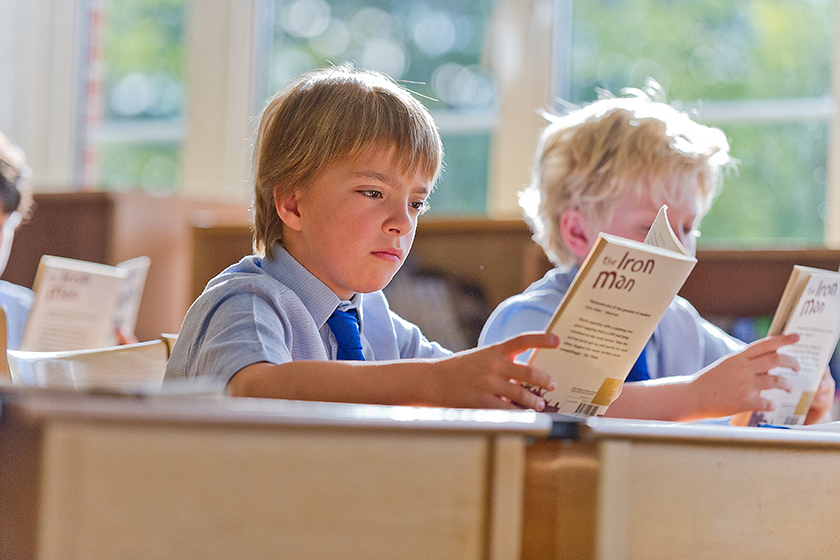What’s Next for Children’s Literature in the Digital Age?
By
7 years ago
Is the book dated, crushed by the power of the appeal of technology? Or can it survive and continue to inspire and excite the imagination of future generations of children?

Victoria Lambert considers the survival of books when confronted with technology and comes up with some surprising conclusions.

St James Junior School
Technology was supposed to give us more free time – to see family, have fun and, of course, to read. Yet, the clever inventions and mechanical advances of the past century, which brought us the dishwasher, washing machine and hoover, have also brought new ways to spend our leisure time and other ways to communicate. Who has time for family – let alone Charles Dickens – with the advent of the internet, mobile phones and tablets?
Parents and children alike have become masters of mental multi-tasking but at a cost to concentration and comprehension. Long-form journalism has become an endangered format, even in The New Yorker or the Sunday Times Magazine which promoted in-depth reads, viz the wildly popular current affairs website Buzzfeed, which reduces even serious stories to lists.
Yet, many claim that while the medium is changing, content and purpose are the same. We’re swapping newspapers for the internet, getting bedtime stories delivered via podcast, ditching hardcover books for e-reads. Does it matter what we and our children read – a text message, social media, story apps – as long as there are words?
Do we still read books for pleasure?
Whisper it in front of the bookworms, but has reading books for pleasure, as the Victorians did, had its day?
It’s a complex situation, says Professor Guy Merchant, professor of literacy in education at Sheffield Hallam University, but not all bad news. ‘Book sales remain high, and although e-book sales are rising rapidly there is no reason to believe that we are witnessing the death of the book,’ he explains. ‘Children’s literature continues to attract some of the finest writers and illustrators, and although Children’s Laureate Malorie Blackman is campaigning for more reading for pleasure, I don’t believe it’s in terminal decline. We want children to enjoy reading as a leisure activity, but we also need to recognise the contribution of new digital forms.’
Jim Parks, creative director of the Guildford Book Festival, one of the 350 literary events held in this country every year, most of which target young readers and schools, agrees. ‘Humans have enjoyed stories for thousands of years and will do so for thousands more. The physical mediums might change and evolve, and digital may become the leading format for all genres, but stories will continue to amaze and thrill readers of all ages. People love a good tale, and that won’t go away,’ says Parks.
Children’s literature bestsellers
So it’s hard to argue that children’s literature isn’t vibrant. According to the industry bible, The Bookseller, in the first half of 2014, sales in the children’s category rose by 9.1 per cent compared to 2013.
Last year, three of the top five best-selling children’s authors, Julia Donaldson, Jeff Kinney and David Walliams, had a combined sales value of £28.9m and the PLR (Public Lending Right), which manages all library loans, revealed that six of the top ten most borrowed authors wrote for children.

Beeston Hall
Children are even turning into reading activists, thanks to The Reading Agency, a literacy charity for 11 to 24-year-olds, which partners public libraries to encourage reading through social youth-led activities. World Book Night offers free books.
So perhaps we’re confusing our own passion for technology with what our children like – or want. E-readers may be on our shopping list, but children seem to recognise literary critic Northrop Frye’s observation: ‘The most technologically efficient machine that man has ever invented is the book’.
Print or kindle?
Jenny Monaghan, head librarian at King Alfred School, London says, ‘Students prefer books to e-readers. Children in the Year 9 book club recoil at the idea of a Kindle. They like the idea of making recommendations to friends.’
Perhaps it falls to adults to encourage more digital use, not less. ‘Kindles can open up reading for some students, like those with dyslexia who benefit from the possibility of changing backgrounds’, says Monaghan. Professor Merchant, who specialises in research into digital literacy, adds, ‘Young children respond positively to interactive story apps on iPads and there are some great resources available and huge potential for future development.’
Programme manager Claire Styles of The Reading Agency says, ‘Digital books are sometimes favoured by teens as it means no one knows what they’re reading – they can’t be judged for choosing something too easy or unfashionable.’
Professor Merchant points out, ‘With the advent of digital communication, there is more reading and writing going on now than at any other point in history’.
The experts don’t believe digital will ever replace books. Monaghan points to browsing: ‘E-book retailers recommend using algorithms to find books which interest you, but browsing in libraries and book shops helps extend the range, and going with parents is still a treat.’ Styles agrees but adds that we shouldn’t be too obsessed with our children’s reading habits: ‘The definition of reading is too narrow – focusing in on fiction – but young people read in all areas of their lives: texting, researching, reading music lyrics and film scripts. As long as they are reading more than they would otherwise do, this is all valid’.
Or as novelist Maya Angelou put it: ‘Any book that helps a child to form a habit of reading, to make reading one of his deep and continuing needs, is good for him.’
READ MORE: How to Encourage Reluctant Readers / The Pros and Cons of Technology in the Classroom



